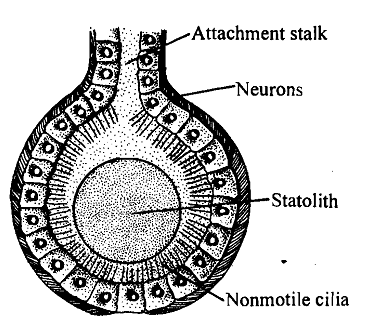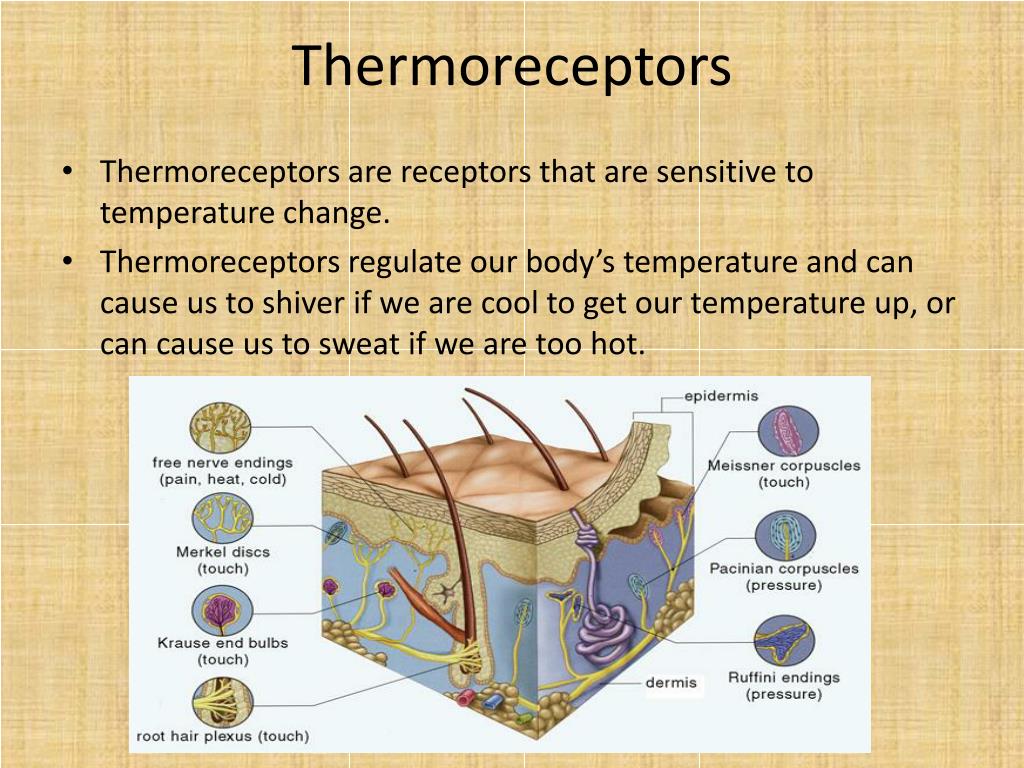Aug 14, 2023The stimulus binding to each receptor varies for each taste. Sweet, umami and bitter tastes are detected by G-protein coupled receptors (GPCRs). These receptors recognize and can discriminate a wide variety of substances by attaching to different domains on the receptor complex. Both saccharides, as well as proteins, trigger sweet sensations.
Runx1 Controls Terminal Morphology and Mechanosensitivity of VGLUT3-expressing C-Mechanoreceptors | Journal of Neuroscience
Four major types of encapsulated mechanoreceptors are specialized to provide information to the central nervous system about touch, pressure, vibration, and cutaneous tension: Meissner’s corpuscles, Pacinian corpuscles, Merkel’s disks, and Ruffini’s corpuscles (Figure 9.3 and Table 9.1). These receptors are referred to collectively as low-threshold (or high-sensitivity) mechanoreceptors

Source Image: expertsmind.com
Download Image
After reading this section, you should be able to-Define sensory receptor.; Define transduction, perception, sensation, and adaptation.; Distinguish between tonic and phasic receptors.; Compare and contrast the types of sensory receptors based on the type of stimulus (i.e., thermoreceptor, photoreceptor, chemoreceptor, baroreceptor, nociceptor [pain receptor], mechanoreceptor).

Source Image: choosenewleaf.com
Download Image
2-point discrimination; Vibration and Temperature sensation – Notes on Medicine/Surgery Mechanoreceptor. A mechanoreceptor, also called mechanoceptor, is a sensory receptor that responds to mechanical pressure or distortion. Mechanoreceptors are innervated by sensory neurons that convert mechanical pressure into electrical signals that, in animals, are sent to the central nervous system .

Source Image: dundeemedstudentnotes.wordpress.com
Download Image
Receptors For Both Hearing And __________ Are Mechanoreceptors.
Mechanoreceptor. A mechanoreceptor, also called mechanoceptor, is a sensory receptor that responds to mechanical pressure or distortion. Mechanoreceptors are innervated by sensory neurons that convert mechanical pressure into electrical signals that, in animals, are sent to the central nervous system . Reception of Sound In mammals, sound waves are collected by the external, cartilaginous part of the ear called the pinna, then travel through the auditory canal and cause vibration of the thin diaphragm called the tympanum or ear drum, the innermost part of the outer ear (illustrated in Figure 9.2.4.1. 2 ).
2-point discrimination; Vibration and Temperature sensation – Notes on Medicine/Surgery
Jan 17, 2023Key Terms. photoreceptor: A specialized neuron able to detect and react to light.; mechanoreceptor: Any receptor that provides an organism with information about mechanical changes in its environment such as movement, tension, and pressure.; baroreceptor: A nerve ending that is sensitive to changes in blood pressure.; Sensory receptors can be classified by the type of stimulus that generates a Chapter 12: The Somatic Sensory System Flashcards | Quizlet

Source Image: quizlet.com
Download Image
psychology exam by ashlyG – Issuu Jan 17, 2023Key Terms. photoreceptor: A specialized neuron able to detect and react to light.; mechanoreceptor: Any receptor that provides an organism with information about mechanical changes in its environment such as movement, tension, and pressure.; baroreceptor: A nerve ending that is sensitive to changes in blood pressure.; Sensory receptors can be classified by the type of stimulus that generates a

Source Image: issuu.com
Download Image
Runx1 Controls Terminal Morphology and Mechanosensitivity of VGLUT3-expressing C-Mechanoreceptors | Journal of Neuroscience Aug 14, 2023The stimulus binding to each receptor varies for each taste. Sweet, umami and bitter tastes are detected by G-protein coupled receptors (GPCRs). These receptors recognize and can discriminate a wide variety of substances by attaching to different domains on the receptor complex. Both saccharides, as well as proteins, trigger sweet sensations.

Source Image: jneurosci.org
Download Image
2-point discrimination; Vibration and Temperature sensation – Notes on Medicine/Surgery After reading this section, you should be able to-Define sensory receptor.; Define transduction, perception, sensation, and adaptation.; Distinguish between tonic and phasic receptors.; Compare and contrast the types of sensory receptors based on the type of stimulus (i.e., thermoreceptor, photoreceptor, chemoreceptor, baroreceptor, nociceptor [pain receptor], mechanoreceptor).

Source Image: dundeemedstudentnotes.wordpress.com
Download Image
PPT – Senses System PowerPoint Presentation, free download – ID:3057874 Mechanoreceptors respond to mechanical forces such as pressure, roughness, vibration, and stretching. Most mechanoreceptors are found in the skin and are needed for the sense of touch. Mechanoreceptors are also found in the inner ear where they are needed for the senses of hearing and balance. Thermoreceptors respond to variations in

Source Image: slideserve.com
Download Image
Life | Free Full-Text | Cytoskeleton Markers in the Spinal Cord and Mechanoreceptors of Thick-Toed Geckos after Prolonged Space Flights Mechanoreceptor. A mechanoreceptor, also called mechanoceptor, is a sensory receptor that responds to mechanical pressure or distortion. Mechanoreceptors are innervated by sensory neurons that convert mechanical pressure into electrical signals that, in animals, are sent to the central nervous system .

Source Image: mdpi.com
Download Image
Chemoreceptors Definition, Location & Examples – Lesson | Study.com Reception of Sound In mammals, sound waves are collected by the external, cartilaginous part of the ear called the pinna, then travel through the auditory canal and cause vibration of the thin diaphragm called the tympanum or ear drum, the innermost part of the outer ear (illustrated in Figure 9.2.4.1. 2 ).

Source Image: study.com
Download Image
psychology exam by ashlyG – Issuu
Chemoreceptors Definition, Location & Examples – Lesson | Study.com Four major types of encapsulated mechanoreceptors are specialized to provide information to the central nervous system about touch, pressure, vibration, and cutaneous tension: Meissner’s corpuscles, Pacinian corpuscles, Merkel’s disks, and Ruffini’s corpuscles (Figure 9.3 and Table 9.1). These receptors are referred to collectively as low-threshold (or high-sensitivity) mechanoreceptors
2-point discrimination; Vibration and Temperature sensation – Notes on Medicine/Surgery Life | Free Full-Text | Cytoskeleton Markers in the Spinal Cord and Mechanoreceptors of Thick-Toed Geckos after Prolonged Space Flights Mechanoreceptors respond to mechanical forces such as pressure, roughness, vibration, and stretching. Most mechanoreceptors are found in the skin and are needed for the sense of touch. Mechanoreceptors are also found in the inner ear where they are needed for the senses of hearing and balance. Thermoreceptors respond to variations in